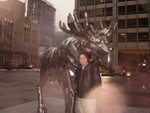Tomb of Saint Hyacinth, who brought the Domicans to Poland. Centuries later they became a center for resistence to the Third Reich, and later the communists, using their cloister as one of the few spheres of freedom in Communist Krakow.
Krakow is the beautiful old royal capital of Poland and the home diocese of John Paul II. This was my second visit to this holy city. It provides an interesting context to study the social doctrine of the Church, because the ancient market squares and onion-spired churches of this city have witnessed so much social change. At first were the foreign occupations of Poland by Austria, Russia, and Prussia. They divided the Polish land among themselves, but the Polish nation did not die. It lived on in its language and culture, above all support by the Roman Catholic faith of the people. It was the vigor of this culture that allowed a new Polish state to rise up after the World War One. Although the occupation of the Third Reich and than the imposition of communist rule soon came in an attempt to once again extinguish the Polish nation.

These were the years that John Paul II was a priest and bishop in Krakow. He saw the oppression that these foreign powers had over the Polish people. This was his school on the social doctrine of the Church. It was the lived experience of living under repressive regimes. This is important to keep in mind, since it shows that when the Church teaches on social issues they are not proclaiming “pie-in-the-sky” ideas, but explaining what we have learned through practical experience. The communist regime fell. It was truly a revolution, but unlike most revolutions this was truly peaceful. There was barely any bloodshed, almost no violence, and little if any vengeance. In his social encyclical, Centisimus Annus, John Paul II presents this revolution in light of the teachings of the Church. From a historical perspective this makes sense, and in the two decades since the revolution even secular scholars acknowledge the great role that the Church has played in bringing about the collapse of communism in Europe due to her moral and intellectual authority.
Walking inside the Domincan cloister, which also oddly enough doubles as their cemetrary (do you think this lady knows she is walking over the corpses of literally thousands of Dominicans?).
There are however questions about the future of Poland now that it has developed its free-market economy. The nation identity that allowed Poland to reemerge after World War One and resist the nation crushing policies of the Nazis and communists was dependent on a strong Catholic identity. Will Poland remain Catholic as it becomes more prosperous and more integrated with the European Union, which is very often hostile to the legitimate insight that all Christians, and especially Catholics have to offer? If they do not remain Catholic, will the Polish nation erode and what would the consequences be for society? These are not just questions to ponder about some country far away, and seemingly insignificant, but also questions that as Americans we must answer. Historically we cannot deny the role Christianity has played in the formation of our own country. This is clear in the Declaration of Independence, which grounds all our cherished rights in the gifts of the Creator-God, but also in fairly modern times with the essential role that Christians and Catholics played in the civil rights movements. Who after all can forget that Martin Luther King, Jr. was a Protestant minister or the images of nuns and priests walking arm in arm with African Americans during the many peaceful protests of those years that brought about necessary social changes? Can America maintain her commitments to life, liberty, and the pursuit of happiness if she does not remain faithful to the Christian conscience that gave rise to them?
 John Paul II, when he was still Karol Cardinal Wojtyla
John Paul II, when he was still Karol Cardinal Wojtyla
To ponder this question I return to Krakow, to the brick-gothic Church of the Dominicans on a Sunday evening for the university students’ Mass. As the time approaches for Mass to begin the students come in. Soon the pews are filled, next the choir stalls and folding chairs, and soon there is only standing room left. Even this is taken up as students find their places for Mass in side-chapels and even empty confessionals. This is the sign of hope for the Polish nation, as these students see that the best way to be good citizens of the world is to be first be good Poles, and the only way to do this is to be good Catholics. They come to the Church because this is where they are truly feed more than what the world can offer, and catch a glimpse of the greatness that is promised to them by a God that loves them. The Church here and now offers the same to each of us, if we can allow ourselves to be feed and to be awed.





